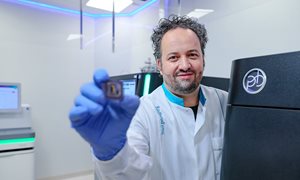
Getting enough physical activity is important for heart health. But how can we ensure that people who struggle with this can maintain it? And is intense and frequent exercise good for the heart? Researchers, led by exercise physiologist Thijs Eijsvogels from Radboud university medical center, will seek answers to these questions. Radboudumc is also collaborating with co-researcher Niels Riksen on a study on the prevention of heart attacks and strokes. These projects are made possible by the Dutch Heart Foundation.
We know that exercise is beneficial for our health and reduces the risk of cardiovascular diseases. In fact, it is essential. Even for people with heart disease, regular exercise contributes to better health, including heart health. But how can we encourage people with cardiovascular diseases to sustain increased physical activity in the long term? And what are the effects of prolonged intense and heavy exercise on heart health? A new consortium, named FIT-HEART, aims to address these issues over the next few years. With a €3 million grant from the Dutch Heart Foundation, they will begin various studies focused on specific groups with distinct exercise patterns.
Risk groups
For people with cardiovascular diseases or those at high risk, the researchers will develop and scientifically test exercise programs. These programs will use a buddy system and rewards, such as personal messages from family, friends, or caregivers when exercise goals are achieved. The idea is that this can prevent a relapse in physical activity. The researchers will build on existing, successful programs and adapt them for specific target groups. These include patients with coronary artery disease, young people with congenital heart defects, and women who have experienced preeclampsia.
Intensive exercise
The researchers will also investigate the limits of safe intense and frequent exercise for the heart. They will use previously collected data on the heart health of both professional athletes and recreational athletes who engage in intense and frequent exercise. By analyzing this data, they can study the effects of these activities for up to fifteen years. They will use imaging techniques like CT and MRI scans, as well as AI and laboratory tests focusing on inflammation. Data from fitness watches will also be analyzed. By combining these technologies, the researchers hope to gain new insights into the limits of safe exercise and how long-term physical activity affects the heart.
Practical advice
This project involves collaboration between researchers from all university medical centers, several hospitals and a number of universities, including Radboud University. The consortium is led by Thijs Eijsvogels, exercise physiologist at Radboudumc: ‘I am extremely pleased that, with the support of the Heart Foundation, we can start this national collaboration. In addition, we aim to actively raise public awareness of the benefits of an active lifestyle. Our ambition is to quickly translate the research findings into practical guidelines and advice that can become part of everyday practice. I am confident that this will help us better prevent cardiovascular diseases and, when necessary, treat them. This will also contribute to overall public health by promoting safe and effective sports and exercise behaviors.’
Prevention of heart attack and stroke
The Dutch Heart Foundation also grants a multimillion-dollar subsidy to a large consortium that will conduct research on arteriosclerosis, the leading cause of heart attacks and strokes. Patients with arteriosclerosis currently all receive the same therapy, even though there are significant differences between individuals. One type of arteriosclerosis can be much more dangerous than another. The researchers aim to unravel how arteriosclerosis develops by studying various factors that play a role in it, such as fat metabolism, the immune system, and gut bacteria. They will investigate how different types of arteriosclerosis can be distinguished, for example, through blood tests and scans of the blood vessels.
They also want to better predict how patient groups will respond to medication. This way, they hope to tailor the therapy of heart and vascular diseases caused by arteriosclerosis more specifically to the individual patient.
All university medical centers are collaborating in this research, led by researchers from UMC Utrecht, Erasmus MC, Amsterdam UMC, and Professor of Vascular Medicine Niels Riksen from Radboudumc.
-
Want to know more about these subjects? Click on the buttons below for more news.
More information
Pauline Dekhuijzen

wetenschaps- en persvoorlichter






